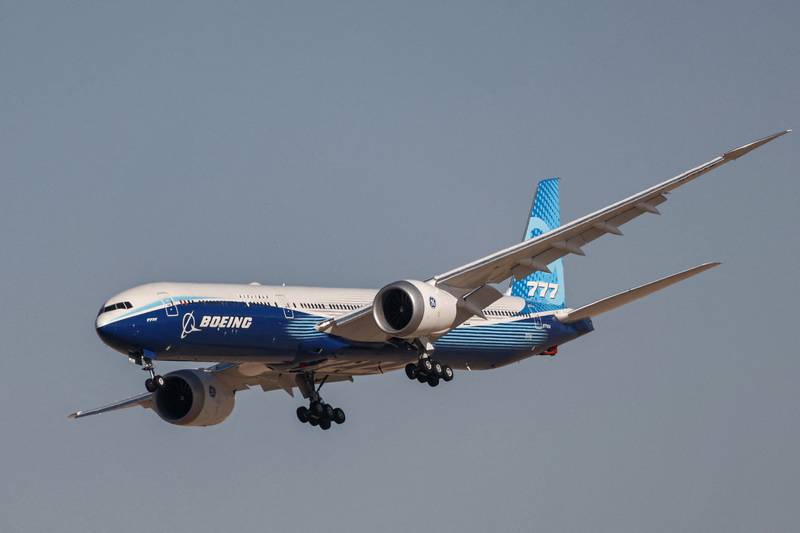Boeing offers promise of comfort on 777X jet but no visibility on delivery schedule

Expect the unexpected they say. But if and when you find a chance to board a Boeing 777X as a passenger, expect the expected: a smooth and comfortable aviation experience.
“You are going to find that the ride is very smooth,” Capt Heather Ross, Boeing’s deputy chief pilot for the 777 and 777X programme, told The National on board the test aircraft on Sunday. “You will find it is a very comfortable ride … a comfortable experience.”
Parked on the tarmac at the Dubai Airshow, which is being held at Dubai World Central, the sheer size of the aircraft is impressive to say the least.
However, it is difficult to imagine a smoother ride or envision comfort while standing in the middle of a cabin lined up with water tanks, where rows of passengers seats should be.
Equipment stations to gauge the performance of the test aircraft were dotted throughout the length of the jet, where perhaps service galleys will be set up once it enters commercial service.
Boeing engineers, pilots and its public relations team were also eager to warn visiting media of “tripping hazards” on board the test plane.
But Capt Ross, who flew the jet from Seattle to Dubai on Tuesday, its longest and first international flight, said the ride quality features have been migrated from its 787 jet and will offer a better experience than that of the legacy Boeing 777 aircraft.
“We have some additional features – ride-quality features that are on this plane and on 787s,” she said. The jet, once it goes into commercial service, will come in two variations – the 777-8 and the 777-9. The 777-8 will seat between 350 and 375 passengers while the bigger variant can carry between 400 and 425 passengers, both in a two-class configuration.
There is more room available in the cabin of 777-9 variant. It is four inches wider, even though it has the same exterior circumference as the older aircraft. Boeing has sculpted interior walls for additional space, all the way to back of the cabin.
The Boeing 777X, which made its maiden flight in January 2020, is equipped with two GE 9X engines that are smaller than those on the older 777ER variant, which makes it more fuel efficient – 12 per cent better on fuel consumption and 10 per cent lower on operating costs than its competition, according to the US plane maker. Its features include folding wing tips, allowing for an extended span of seven metres to maximise fuel efficiency.
Bringing the test plane to Dubai, which was unveiled at the Dubai Airshow in 2013 amid much fanfare, was “exciting for the entire team”, Capt Ross said. “We have been working really hard for the past couple of years, executing our flight test programme,” she said.
“We have been making good progress, all through the pandemic. Our team continued to operate [as] we found ways to be able to fly the plane safely. We have done that and that has been kind of phenomenal.”
The company has flown its 777X test plane every day, she said, declining to say how far Boeing is into its test programme, or when the 777X may receive the US aviation regulator’s safety certification for commercial operations.
Emirates, the world biggest long-haul airline, has 126 Boeing 777X jets on order and is holding discussions with the Chicago-based plane maker “before and during” the Dubai Airshow about the aircraft, Sheikh Ahmed bin Saeed, chairman and chief executive of Emirates airline and group, said earlier this month.
Boeing's move to bring the 777X in Emirates' backyard comes amid the airline's growing impatience over the aircraft's delay. On Sunday, Emirates president Tim Clark said the airline was rethinking its fleet plans, including delivery schedules and the number of planes on order.
Emirates could seek to accelerate handovers of the Airbus A350 amid a lack of clarity on Boeing’s 777X delivery schedule, he told Bloomberg at Airshow.
“We will be looking at what the outcome is of the Boeing discussions we are about to have to see how far they have got on,” Mr Clark said.
“We are talking to Airbus about what the reality of the situation is and during the course of the next few days, we will decide what we are going to do.”
However, Capt Ross said Boeing is “moving the ball” on the jet's flight tests and “the truth of the matter is that we are making a good progress”.
Pilots trained to fly the current global fleet of Boeing 777s – and all its variants – should also find it easy to transition to the new-age jet.
“We do have a ‘differences training’ programme and that will help pilots transition from the 777, what we call the legacy or classical plane, to this,” she said.
The new jet, also has commonalities with the Boeing 787 and a similar training programme could help those pilots to transition as well. “Some of the interactions are a little bit different on this one,” Capt Ross said.
“As far as the way the plane handles, it is very similar to 777 legacy [jets] or even 787s. Flight controls are adjusted for weight and the geometry and it is really very comfortable.”
